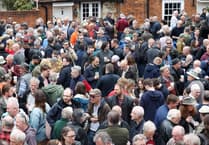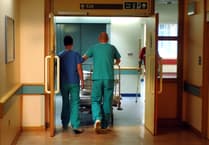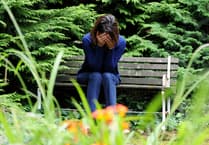ARCHBISHOP Desmond Tutu visited Petersfield in 1988 at the request of his friend, Canon Cyprian Thorpe, who at the time lived in the town and was a lay reader at St Peter’s Church.
The South African Archbishop won the 1984 Nobel Peace Prize for his opposition to apartheid in South Africa.
And his visit to the town left an indelible memory on those who met him.
The Ray family of The Spain hosted him, and Alistair Ray collected him from Heathrow airport and drove him back to Petersfield.
Susan Ray said: “What an incredible man he was to his own country and the world.
“Cyprian Thorpe retired to Petersfield and having worked and lived in Lesotho, he was a good friend of Tutu.
“My sister Hilary met Cyprian in Lesotho when volunteering there in the early 80s. My brother Alastair collected the archbishop by car from Heathrow, which sounds crazy with security as it is now.
“My father supported the South African Churches Development Trust, and they held an after-service reception in my parents’ garden in The Spain.”
Former church warden John Deavin added: “The Ray family transported Archbishop Tutu about and entertained him at Goodyers in The Spain.
“Canon Cyprian Thorpe invited him to Petersfield, but Cyprian died ten years ago.
“I remember meeting Archbishop Tutu walking down Sheep Street to The Spain after Eucharist at St Peter’s.”
And in the St Peter’s parish magazine The Rock of August 1988 – the edition after the Archbishop’s visit – Gill Hancock described the service led by the visiting cleric.
“In the crowded church the first sight of him for most of us was simply the top of his mitre, as he moved up the central aisle.
“Then he moved up into the pulpit and made himself known to us in a way that changed us all.
“A slight, smiling figure, with hair greying at the temples, and the light glinting of his spectacles, he admonished us first like a benevolent primary school teacher for the feebleness of our greeting to him, joked about a sight board behind him to make him more visible to us, claimed familiarity with our church and town from a previous visit, and then began to speak to us.
“My strongest first impression was the positive and affirming energy and happiness that radiated from him.
“Reminding us of Christ’s promise to Peter that the world would be full of his family, Desmond Tutu called us his brothers and sisters, and made us feel that was exactly what we most wanted to be.
“He spoke of our Christian corporate life together, and how we all have a part in what is done.
“With his arms spread wide the pulpit, he shared the credit for his Nobel Peace Prize with us.
“He told us that our prayers, even our reluctant half-hearted prayers, are the best help we can give.
“ ‘We can do what we do’ he said, ‘because of what you here are doing’.”
“Our inadequate prayers may enable a man in a solitary confinement cell undergoing torture not to become embittered and may help him to forgive.
“The strength of those who can forgive, he said, is not in themselves but because of their prayers.
“I don’t know others felt, but I could have wept with his generosity.
“He was giving the inestimable gift of being needed and useful, and I had so far given nothing.
“He gave us all, as well as the gift of his utter and simple belief in the efficacy of prayer and his joy in his faith.
“His is not an easy path. ‘If we engage with God in prayer’, he explained, ‘we usually get into a lot of trouble’. And the Holy Spirit has certainly led him into the wilderness.
“In his beautiful actor’s voice, with humour, lightness and deep sincerity, using every variation of pitch and pace down to a perfectly-heard whisper, he asked to be his partners and fellow workers.
“ ‘Black and white can hold hands together and stride forwards to God’s future’, he said.
“ ‘Remember that you belong together, black and white, that you can only survive together, black and white’.
“I understand in a way I have not understood before, and I believe him to be right.”



